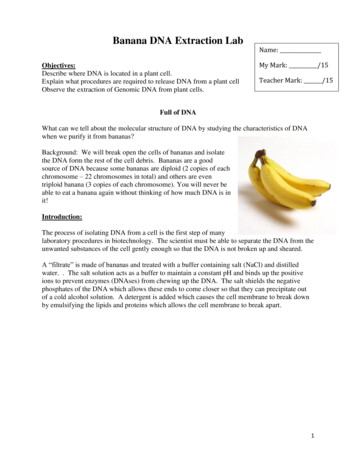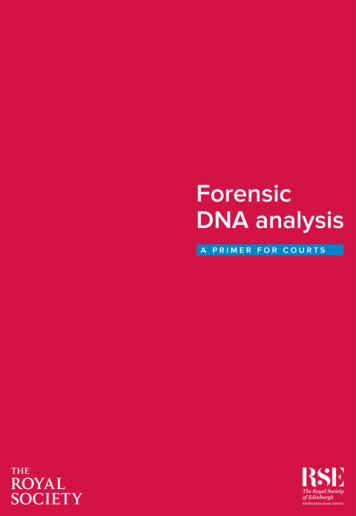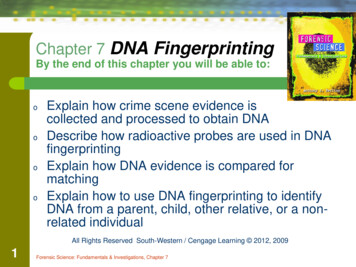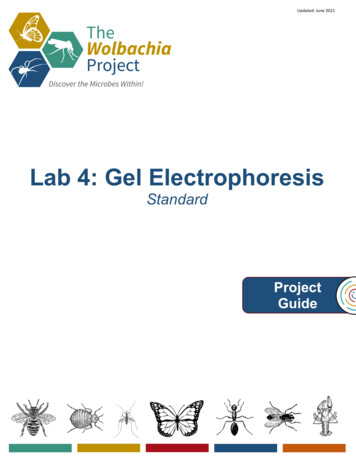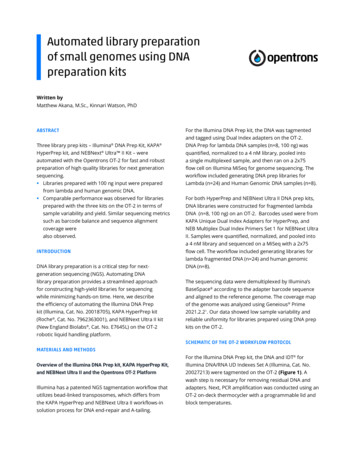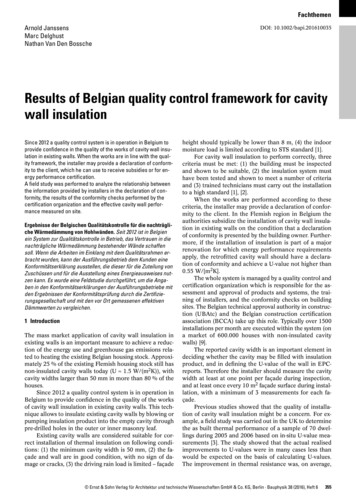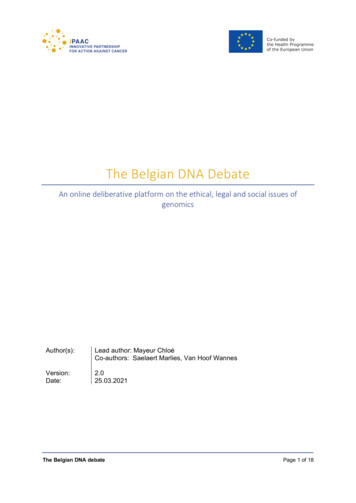
Transcription
The Belgian DNA DebateAn online deliberative platform on the ethical, legal and social issues ofgenomicsAuthor(s):Lead author: Mayeur ChloéCo-authors: Saelaert Marlies, Van Hoof WannesVersion:Date:2.025.03.2021The Belgian DNA debatePage 1 of 18
ContentsExecutive summary .41Introduction .52Methods .53Results .7DNA and identity .7Genomic information and its impact on behaviour . 8Genomic information and its repercussion on responsibility . 8The common good .9Genomic data sharing and protection . 10Recommendations on using genomic information . 104Discussion .11DNA and identity .11Genomic information and its impact on behaviour . 12Genomic information and its repercussion on responsibility . 12The common good .12Genomic data sharing and protection . 13A soft version of the precautionary approach . 13Future research.145Conclusion .146Acknowledgements .157Statement of Ethics .158Conflict of Interest Statement . 159Funding Sources .1510Author Contributions .1511References .16The Belgian DNA debatePage 2 of 18
This report arises from the Innovative Partnership for Action Against Cancer Joint Action, which has receivedfunding from the European Union through the Consumers, Health, Agriculture and Food Executive Agency of theEuropean Commission, in the framework of the Health Programme 2014-2020. The content of this report representsthe views of the author/s only and is his/her/their sole responsibility; it cannot be considered to reflect the views ofthe European Commission and/or the Consumers, Health, Agriculture and Food Executive Agency or any otherbody of the European Union. The European Commission and the Agency do not accept any responsibility for usethat may be made of the information it contains. The authors are not responsible for any further and future use ofthe report by third parties and third-party translations.The Belgian DNA debatePage 3 of 18
Executive summaryIntroduction: Genomics is increasingly being implemented in society. To fully realise thisimplementation, citizens should be consulted about their perspectives on genomics and itsassociated ethical, legal and social issues (ELSI), to enable them to co-create with experts asociety-supported framework in genomics.Methods: A Belgian online DNA debate was organised, where 1127 citizens contributed to itsdeliberative platform.Results: Contributors expressed a dual attitude towards the societal use of genomicinformation throughout five main themes. Firstly, contributors considered DNA to have asignificant but non-deterministic impact on identity. The second theme describes how genomicinformation may guide people’s behaviour, but have unfavourable effects such aspsychological distress. The third theme covers the tension between a genomics-basedresponsibility and the rejection of genetic discrimination. The fourth theme depicts howgenomic information may be useful for the common good and society at large but how,nevertheless, it should be people’s free choice to use this information. In the fifth theme,contributors expressed both a willingness to share their data and a caution towards the harmand abuses this may engender. Finally, contributors formulated some recommendations forthe responsible implementation of genomics.Discussion and conclusion: The attitude of contributors towards the societal use of genomicinformation and its ELSI aligns with a soft precautionary approach, in which prudence and theweighing of different values should result in protective measures against potential risks andharms. Further societal implementation of genomics should include these values andconcerns.The Belgian DNA debatePage 4 of 18
1 IntroductionGenomic information is used increasingly in medicine. Several countries have already madeconsiderable investments to implement genomics in mainstream healthcare [1,2]. GenomicsEngland sequenced 100.000 genomes of patients and their relatives and spent over 415million US dollars to establish a centralised infrastructure for whole-genome sequencingservices [2]. The French Plan for Genomic Medicine 2025 and Australian Genomics launchednumerous projects to integrate genomics into healthcare and evaluate its clinical utility andcost-effectiveness [2]. On a European level, the collaborative 1 Million Genomes initiative hasbeen launched to sequence at least one million genomes by 2022 to improve diseaseprevention and personalised treatments [3]. Besides healthcare services, genealogical andforensic services sometimes use genomic technologies. Consequently, everyone may likelybe confronted directly or indirectly with genomics shortly [4–6].What is more, the full accomplishment of genomics relies on the collection and sharing of datafrom patients and the general population [4,7]. The involvement and trust of citizens arerequired to build a representative dataset and sustainable database, which would facilitate anaccurate interpretation of genetic variants and data [2,8,9]. Additionally, the implementation ofgenomic technologies in national healthcare systems often implies a ‘learning by doing’approach [10], which ensures that routine diagnostics in clinical care are embedded in a largerevidence-generating framework. Evidence and knowledge of innovation are generated in realtime, avoiding demanding, expensive and time-consuming phase II and III clinical trials.However, this approach entails an interface between research and care, with careful ethicalconsiderations [8].For all the above reasons, it is important to include a citizen perspective on genomics and itsassociated ethical, legal and social issues (ELSI), to ensure that societal values guide thetechnology and not the other way around. Global citizen deliberation has been recognised asan essential step when implementing genomic technologies [11]. Understanding citizens’ layexpertise and values may enrich the analysis of ELSI in genomics, and be essential to installappropriate engagement and communication strategies [4,12]. In recent years, variousinternational initiatives have been taken in which citizens, together with experts, activelyengaged in the co-creation of an ethical framework concerning ELSI in genomics. Within theGenomics England project, citizens indicated that genomics should be organised as a form ofa social contract with reciprocity, altruism and solidarity as core values [13]. The Sienna projectaims to capture European public views on the ELSI of human genetics and genomics, humanenhancement, artificial intelligence and robotics [12]. In France, the bioethical law reviewentailed public consultations with a specific interest in genomics [14]. In Belgium, a citizenforum was organised on request of the Ministry of Public Health [15]. The Belgian DNA debateattempts to apply these deliberative principles to an online methodology reaching a largerpopulation.2 MethodsThe Belgian DNA debate was organised as an online deliberative platform to investigateBelgian citizens’ attitudes towards genomics and its associated ELSI. Such intervention aimsat creating a space where citizens can meaningfully contribute to producing policies or otherforms of governance [16,17]. Online public deliberations tend to evoke well-sourced, factuallyargued and more explicitly justified arguments [18]. Moreover, they tend to be oriented moreThe Belgian DNA debatePage 5 of 18
manifestly to the common good, for instance, collective solutions that transcend personalinterests; which may be relevant to topics such as the societal use of genomic information [18].The open call to participate was disseminated in national media (newspaper articles, radio andtelevision interviews), newsletters from partnering organisations and high school teachersgroups on Facebook. Although this call was limited to Belgian information channels and thewebsite was only Dutch-and-French speaking, a few contributions may not be from Belgiancitizens. However, all students who participated came from about 75 high schools in Belgium,and activity on the website corresponds strongly to timing in the Belgian communicationstrategy.The online debate followed the general structure of a participative intervention around minipublics: inform, deliberate, produce [16,17].The project deployed four strategies to inform citizens before participation: an informationbooklet, a short video, an interactive test and a pedagogical dossier. These informationmaterials contained practical cases, real-life examples and discussion exercises to elicitdeliberation about the ELSI in genomics and help teachers challenge their students in theclassroom. All information materials and media publications contained links to the DNA debatewebsite.A dedicated website (dnadebat.be/debatadn.be) was launched in Dutch and French to gathercitizens’ contributions and stimulate further debate. This website was designed for directingvisitors to the deliberative platform, for example, through the interactive test indicating whatkind of society they would live in if everyone had the same opinion as them about genomics.The debate was structured around one central question - How should we use genomicinformation in society? - followed by five sub-questions to provide participants with morestructure:1) What encourages me to learn more about my DNA, or what dissuades me from doing it?Why?2) What motivates me to share my DNA data, or what stops me from doing so? Why?3) A genetic passport for all: a good idea or not? Why?4) How would DNA be used in my ideal society? What applications should be avoided? Why?5) Do you want to share another idea about how we should deal with DNA in society?To post their contributions, each participant had to create an anonymous account on thewebsite by choosing their alias. Since every account was linked to a unique IP address, GoogleAnalytics guaranteed that each participant posted their contributions through the sameaccount. However, participants could post as many contributions as they wanted. Eachcontribution was moderated to eliminate offensive language and trolling, but moderation waslimited to its minimum to allow all opinions to be heard. In total, 4545 citizens interacted withthe website between 15/10/2019 and 20/03/2020; 2581 citizens filled in the interactive test;1127 citizens contributed to the deliberative platform, which ultimately contained 1258individual threads. Every thread represented one opinion shared by a contributor, followed bya comments section. In this paper, we will focus on the content created on this deliberativeplatform.Our goal was to identify the fundamental norms and values held by contributors regardinggenomic information usage. All the contributions were treated as one big narrative to performan inductive thematic analysis using the NVivo 12 software [19]. In this qualitative method, theThe Belgian DNA debatePage 6 of 18
initial coding is not restricted to any predefined conceptual framework to let themes emergefrom the data naturally. The questions from the website were only used to understand thecontributions in their proper context. Three researchers performed the data analysis andregularly discussed interpretation and interconnectedness between the themes. Sincecontributions were both in French and Dutch, all researchers were fluent in both languages.3 ResultsContributors frequently had a dual attitude towards genomic information usage and balancedits potential benefits with its risks. On the one hand, many contributors believed in theresponsible and valuable use of genomic information, for instance, for preventive medicine orscientific research. On the other hand, many contributors argued that not all the informationcontained in the genome should be known and not everyone should be able to use it for anypurpose since this might engender various risks and harms.Contributors’ dual attitude on genomic information and its potential uses was expressed in fivemain themes: I. DNA and identity, II. Genomic information and its impact on behaviour, III.Genomic information and its repercussion on responsibility, IV. The common good, V.Genomic data sharing and protection. Finally, VI. Recommendations on using genomicinformation summarise contributors’ suggestions throughout the previous themes. Fig. 1presents the main results schematically.DNA and identityOn the one hand, contributors thought genomic information is from far the most personalinformation since it is unique to every person. Besides concerning an individual’s physicalconstitution, character traits and talents, it refers to someone’s roots and relatives. Hence,genomic information was regarded sometimes as a blueprint of someone’s past, current andfuture identity. Contributors depicted how this blueprint does not only allow to identifysomebody but also to characterise and broadly understand this person.Over the short to medium term, I think DNA will allow understanding the intimate functioningof the human being; perhaps even how I manage my own emotions. (Thread no. 71)On the other hand, contributors nuanced the influence of genomics on personal identity sincethey understood that DNA is one influencing component among many others. Contributorssuggested that their identity is also affected by education and practice, socio-economic contextand the environment. Furthermore, they argued that genetic predispositions, especially fordisease, only indicate chances and not absolute certainties, which further reduces the decisiveinfluence of genomics on someone’s life and identity.Both perspectives were repeatedly united in the idea that, despite the significant impact ofDNA on identity, people should not be categorised purely on their DNA, but should be judgedon their actions too. This significant but non-deterministic impact of DNA was expressed inmedical, professional and recreational contexts.Requirements might be imposed concerning your DNA to obtain a particular professionalposition. Anyway, it’s going to get lots of attention. However, your DNA is only an indication ofyour talents, and it doesn’t cover everything. (Thread no. 1104)The Belgian DNA debatePage 7 of 18
Genomic information and its impact on behaviourVery frequently, contributors had a dual attitude towards the impact of genomic information onbehaviour. A common reason for interest in genomic information was that this knowledgewould allow for prevention or lifestyle changes and provide more control over life. Despite thepotential benefits of these actions, contributors mentioned various unfavourable effects ofgenomic information. Firstly, they often warned that if the knowledge of genetic predispositionsenables to avoid future disease, it can also cause psychological distress. This way, genomicinformation holds the paradox of potentially taking away future harms while simultaneouslycreating another type of harm, namely worrying about a potential disease. The inherentuncertainty concerning most genetic predispositions also entails the risk of undue worries sincethese predispositions might never express themselves. In either case, many contributorsfeared that this psychological distress could undermine a general carelessness in life andprevent somebody from enjoying life to the fullest. Moreover, some contributors stated thatgenomic information and its resulting psychological concerns could paradoxically have ademotivating behavioural effect and inhibit preventive actions. To avoid these risks, manycontributors expressed a selective interest in genomic information in which, for instance, theydid not want to know about predispositions for diseases to which no treatment or prevention isavailable.I would only like to know that I'm at high risk for severe illnesses when these can be prevented.If this is not the case, I would not want to know, because I would give up and I would not beable to make the most of life anymore. I think that DNA research should only be used when itcan help people or save lives. (Thread no. 1135)Secondly, some contributors mentioned that knowing too much genomic information wouldmake life overly predefined. Instead, they preferred a partly open future with room for theunexpected. One way to preserve this was, for example, to not inquire genomic informationconcerning personal characteristics or talents. Being in good health and preferring to solveproblems the moment they arise additionally supported this selective interest in genomicinformation.Genomic information and its repercussion on responsibilitySome contributors mentioned that genomic information could inherently introduce theresponsibility to act accordingly. Examples cited referred to reproductive decisions (e.g.choosing for assisted reproduction to avoid an at-risk or ill child) or family communication (e.g.informing relatives about genetic predispositions). Several contributors said that they did notwant genomic information to guide their life. In these cases, not knowing about geneticpredispositions was considered an effective solution to avoid or temper the responsibilities thatgenomic information may imply.However, different contributors argued that the responsibility engendered by genomicinformation should not be taken too far and should not equal the obligation to apply thisinformation into associated actions, whether preventive, therapeutic, or behavioural. Geneticrisks should, for instance, not deprive people of their right to found a family. Additionally anddespite genetic predispositions and innate talents, people should be free to decideautonomously on their behaviour, profession, hobbies, and the like. This idea is in line with thepreference of a (partly) open future. Moreover, people’s freedom to act or not following theirgenomic information and their ability to accomplish things beyond their innate predispositionsfurther supports the opinion that people should not be judged solely on their DNA.The Belgian DNA debatePage 8 of 18
I believe in the willpower of people and their ability to push their boundaries. DNA tells us afew things about us, but we still pull the strings. It is like a cookbook. Once you've read therecipe, you still have the choice whether or not to follow it. And even if you follow it, you arefree to beat the book and do your own thing, to go beyond the example. We have that power,we determine what we (want to) achieve in life, and our DNA is just a tool. (Thread no. 907)Some contributors further reduced the responsibility to know or act following their genomicinformation by claiming that it is not up to humankind to decide on some issues. Examples arethe health of future children or the desirable characteristics of people. This idea was associatedwith the belief that eliminating interpersonal variance could lead to the societal disapproval ofindividuals who do not meet particular standards.I think that people would make some decisions based on the results of DNA tests and, thisway would eliminate all disabilities, for instance. It will be more common for people to abort achild with a disability. I think this is very destructive for society! Diversity is important; everyoneis unique. In my opinion, it should stay that way. (Thread no. 549)In addition to these reflections on personal responsibility, many contributors referred to societaland governmental responsibilities regarding genomic information. Again, these ideas weretwofold. Many contributors believed that the knowledge and use of genomic information shouldbe supported and facilitated by the government. However, the increased availability and useof genomic information should not result in genetic discrimination: despite people’s knowledgeof genetic risks and even when people are unable or unwilling to act in accordance with theirgenomic information, the society and government should avoid that these people fall victim toprofessional, financial or social discrimination.The common goodThe majority of contributors supported the knowledge and use of genomic information for atleast medical, scientific and forensic purposes. Many contributors would be willing to sharetheir genomic data to facilitate these uses, provided that several protective conditions weremet (cf. infra). Many contributors situated the value of genomic information, both in its use forindividual interests and the encouragement of the common good and society. This way, issuesat the individual’s discretion were distinguished from those where the common good may,under certain conditions, determine the use of genomic information or even overrule personalbenefit. Several contributors mentioned that if no one shares their genomic data, scientificprogress and new medical treatments cannot be achieved. Other contributors suggested thatpeople’s DNA could be used for forensic research without their permission or that a geneticpassport would be most effective if, without exception, everyone participated.I think [a genetic passport] is a good idea. The medical world will be able to discover newtreatments for common diseases. It would allow treating some illnesses faster and moreefficiently, which is advantageous for the patient and society. However, I think that some rulesneed to be established. Not everyone should have access to everyone's genetic passport. Ithink only medical people should have access because after all, they are the ones who cantreat diseases. (Thread no. 1236)Nevertheless, most contributors agreed that, as a general rule, citizens should not be forcedto know, use or share their genomic information. Supported by genomic information’sprofoundly personal character, people should be able to individually and freely decide.The Belgian DNA debatePage 9 of 18
Genomic data sharing and protectionFinally, many contributors had a dual attitude towards genomic data sharing. On the one hand,many people were willing to share their data, especially for medical, research and forensicpurposes. Some contributors argued that a central database would be most efficient to storecollected data and referred to several institutions to secure and manage this database,including hospitals, specialised organisations and the government. On the other hand, manypeople pointed out that sharing genomic data holds inherently the risk of abuse and harm. Theinformation could end up with ‘the wrong people’, such as insurance companies, employers orcommercial companies, who could take unjustified advantage of it or use it against them. Manycontributors expressed a sense of uncertainty about the potential current and future uses ofshared data too. They worried about the non-traceability of these data, the actual compared tothe announced usage, unknown future research on their data and safe storage.DNA analysis and genetic engineering have enormous possibilities. But it means that thesepossibilities can also be used negatively. Just as nuclear energy has been misused to produceweapons, genetic engineering could have consequences we cannot foresee yet. It is importantto consider consequences we can predict as well as those we cannot. (Thread no. 1188)Therefore, contributors referred to various preventive measures and different ways to protectdata that could support genomic information usage while avoiding abuses and their resultingharms as much as possible. They frequently emphasised privacy as a precondition for genomicdata sharing to guarantee that they will not experience any disadvantage or discriminationbecause of data sharing. Moreover, contributors endorsed the values of transparency andcontrol. They wanted to know who can access and use their data, for which purposes andwhere they are stored. Procedures for sharing and usage should be controllable and verifiable,either by themselves or by external institutions.There should be a database with people’s data. This database is not online but stored on aspecial service that only doctors can access in case of emergency, and with the injured personconsent. [ ] The database is protected by a special force that prevents hacking. These are allprecautions to avoid data misuses. (Thread no. 357)Contributors often suggested to establish or optimise the legal framework concerning genomicdata sharing to realise its benefits while avoiding its risks and potential abuses.Recommendations on using genomic informationMany contributors had a positive attitude towards and supported the knowledge, use andsharing of genomic information to good advantage in several contexts. Nevertheless, theywere concerned that genomic information could be used against them. Hence, they expectedfrom specialised institutions and public authorities to actively minimise the risks and abusesthey feared. Throughout the five abovementioned themes, contributors suggested variousstrategies to realise this consideration: Promoting a non-reductionist perspective: Despite the impact of DNA on identity, theinfluence of education, environment and social context should be taken into account. Avoiding a genomic imperative: Even though genomic information may contribute toindividual and societal benefit, people should not be obliged to know or use thisinformation. People have the right to autonomously decide on the information theyreceive and the actions they perform. The right not to know and the right to an openfuture should be preserved.The Belgian DNA debatePage 10 of 18
Avoiding genomic discrimination: There is a societal responsibility not to discriminatepeople based on their genetic makeup, even when they are informed about or do notbehave in accordance with their genomic information. Respecting privacy: Since genomic information is ultimately personal, its societal usageshould occur responsibly and with respect for a person’s privacy and integrity.Anonymous data sharing and use are essential to avoid genomic discrimination. Ensuring traceability of and control over shared data: When people share their genomicdata, they want to know where these are stored, who can access these and for whichpurposes these are used. People want to have some control over these issues byconsenting to specific data sharing and usage. Additionally, specialised institutions orgovernmental authorities should control whether genomic information is usedresponsibly. Protecting people against abuses: Many contributors emphasised the need to developnational or international legal frameworks that inhibit potential misuses of sharedgenomic information.4 DiscussionThis article describes the results of the online Belgian DNA debate in which citizens were askedabout their perspective on the societal use of genomic information, its associated ELSI andunderlying norms and values. In the contributions to the deliberative platform, five main themeswere identified.DNA and identityContributors considered DNA as highly significant for someone’s identity. The generalpopulation has previously described DNA as someone’s most personal information and evenas an individual ‘instruction manual’ [5,20,21]. Genomic information has also been consideredcategorically different from other types of information because of its uses outside of healthcareand its familial implications, which may require specific management [13,20]. These generalideas on genetics and identity reflect findings of more specific psychosocial research, forexample, by McConkie-Rosell and colleagues, which thoroughly described the impact of agenetic carrier status on a person’s self-concept or wished-for parental role [22,23]. Likewise,d’Agincourt-Canning described how positive results from BRCA 1/2 testing affect the physical,familial-relational and social self-concept of concerned people [24]. Negative and presymptomatic test results may carry an impact as well, and bring about feelings of, respectively,survivor guilt towards affecte
enhancement, artificial intelligence and robotics [12]. In France, the bioethical law review entailed public consultations with a specific interest in genomics [14]. In Belgium, a citizen forum was organised on request of the Ministry of Public Health [15]. The Belgian DNA debate


